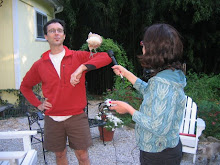Casey and baby bird Baby bird perching on chicken house door
Baby bird perching on chicken house door
 Casey and her new best friend
Casey and her new best friend
 My daughter has a very petite "faux Siamese" cat named Casey. Casey likes to think she's the great hunter, but she rarely harms butterflies (when she's able to catch them). This spring Casey came trotting around the corner with a baby bird in her mouth. I was quite impressed with her stealthy skills, although sorry it was a baby bird and not a MOLE (or a deer, for that matter). Still, it's the "circle of life" or whatever and she was doing what cats are supposed to be programmed to do.
My daughter has a very petite "faux Siamese" cat named Casey. Casey likes to think she's the great hunter, but she rarely harms butterflies (when she's able to catch them). This spring Casey came trotting around the corner with a baby bird in her mouth. I was quite impressed with her stealthy skills, although sorry it was a baby bird and not a MOLE (or a deer, for that matter). Still, it's the "circle of life" or whatever and she was doing what cats are supposed to be programmed to do.
 Baby bird perching on chicken house door
Baby bird perching on chicken house door Casey and her new best friend
Casey and her new best friend My daughter has a very petite "faux Siamese" cat named Casey. Casey likes to think she's the great hunter, but she rarely harms butterflies (when she's able to catch them). This spring Casey came trotting around the corner with a baby bird in her mouth. I was quite impressed with her stealthy skills, although sorry it was a baby bird and not a MOLE (or a deer, for that matter). Still, it's the "circle of life" or whatever and she was doing what cats are supposed to be programmed to do.
My daughter has a very petite "faux Siamese" cat named Casey. Casey likes to think she's the great hunter, but she rarely harms butterflies (when she's able to catch them). This spring Casey came trotting around the corner with a baby bird in her mouth. I was quite impressed with her stealthy skills, although sorry it was a baby bird and not a MOLE (or a deer, for that matter). Still, it's the "circle of life" or whatever and she was doing what cats are supposed to be programmed to do.A while later I noticed Casey coming out of the chicken house. When I peeked in, I found the baby bird laying there unharmed. Casey had put the bird in the bird house where she thought it belonged! Good Kitty.
More Chicken Facts - Bird Flu
According to the TN Department of Agriculture, "Since 1924, there have been three incidences of highly pathogenic bird flu in the United States in domestic poultry. There were no human illnesses reported in connection with these outbreaks, the most recent outbreak in 2004 was confined to one flock and quickly eradicated. " http://tennessee.gov/agriculture/regulate/animals/birdflu.html
According to the Center for Disease Control (CDC)
"We have a small flock of chickens. Is it safe to keep them?
Answer
Yes. In the United States there is no need at present to remove a flock of chickens because of concerns regarding avian influenza. The U.S. Department of Agriculture (USDA) monitors potential infection of poultry and poultry products by avian influenza viruses and other infectious disease agents." http://www.pandemicflu.gov/faq/bird/1098.html
Answer
Yes. In the United States there is no need at present to remove a flock of chickens because of concerns regarding avian influenza. The U.S. Department of Agriculture (USDA) monitors potential infection of poultry and poultry products by avian influenza viruses and other infectious disease agents." http://www.pandemicflu.gov/faq/bird/1098.html
According to the World Health Organization (WHO), "Avian influenza is not transmitted through cooked food. To date, no evidence indicates that anyone has become infected following the consumption of properly cooked poultry or poultry products, even when these foods were contaminated with the H5N1 virus.
Does the virus spread easily from birds to humans?
No. Though more than 100 human cases have occurred in the *current outbreak, this is a small number compared with the huge number of birds affected and the numerous associated opportunities for human exposure, especially in areas where backyard flocks are common. It is not presently understood why some people, and not others, become infected following similar exposures."
Does the virus spread easily from birds to humans?
No. Though more than 100 human cases have occurred in the *current outbreak, this is a small number compared with the huge number of birds affected and the numerous associated opportunities for human exposure, especially in areas where backyard flocks are common. It is not presently understood why some people, and not others, become infected following similar exposures."
* Current outbreak refers to Asia, there is no evidence of Avian Influenza in the U.S. http://www.who.int/csr/disease/avian_influenza/avian_faqs/en/index.html#consequences
While there is no need for concern over bird flu in backyard chickens in the United States, there is cause for awareness, common sense and taking precautions. As with any animal, sanitary practices are imperative for many reasons (common sense). Knowing your animals and noticing of signs of illness - again, common sense. Bottom line - if you are sensible, you should be allowed to have backyard chickens.







No comments:
Post a Comment